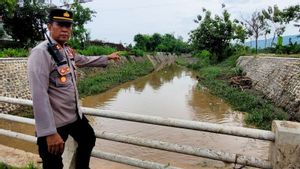JAKARTA - The government and various stakeholders work hand in hand to get out of the challenges that arise due to the COVID-19 pandemic. Apart from trying to reduce the rate of positive cases of COVID-19, the government is also working to restore the national economy through various programs. The government has allocated a budget of Rp.695.2 trillion for the economy and health.
One of the highest budget allocations is to support micro, small and medium enterprises (UMKM), amounting to Rp. 123.46 trillion in the form of interest subsidies, credit guarantees, tax relaxation, and productive assistance.
The government also provides assistance for business management, human resources, infrastructure, including facilitating the digitization of MSMEs. The digitization of MSMEs is basically the government's big agenda for recovery and transformation of the digital economy.
For conventional MSMEs that have been doing more traditional transactions, face to face with both consumers and raw material providers, digitization will be of great help in this pandemic.
"Now, one way to survive during a pandemic is digitization. By transforming digitally, relationships with consumers and raw material providers can be done, said TM Zakir Machmud, Head of the UKM Center, Faculty of Business Economics, University of Indonesia in a Productive Dialogue with the theme" Upgrading MSMEs through Digitalization. "which was held by the Committee for Handling COVID-19 and National Economic Recovery (KPCPEN), Wednesday, November 18.
Efforts to digitize the business processes of MSME players, especially those that are unfamiliar with technological developments, are still difficult because of the collision of the perpetrators' own mindsets.
"So even though we are talking about digitalization, we still have to provide assistance. Assistance takes various forms, it can be through training, coaching, gathering, and consultation. The point is that MSMEs must prepare themselves towards digitalization," said Zakir.
Zakir admitted that this journey towards a digital business process has brought change. With digital, there are also new opportunities that will arise.
"This new opportunity will have a big effect on the economy. In terms of change, there will be losers and gainers," said Zakir.
According to Zakir, the presence of the National Economic Recovery (PEN) program is a form of state presence for MSME actors. However, according to him, it must be seen that the number of those who can take advantage of this is still limited, because the majority of MSMEs are at the micro level who have not been touched by banking services, or do not have a NPWP.
Currently, with the changing situation, MSMEs must be able to adapt, one way is by digitizing and preparing themselves to enter a new world.
"Digital is not just entering, but preparing for change and its consequences later," concluded Zakir.
Responding to ChangeHead of Sales Wahyoo, a start-up application for food stall businesses, Triatmojo Suprasetyo, does not deny that at this time, all aspects are transforming towards digitalization to respond to the changing landscape due to the COVID-19 pandemic.
"Support for digitalization, especially for food stalls, has a positive impact on business people. The support we provide is called P3K (Training, Guidance, Income, and Convenience). This is what raises the status of our MSMEs, especially food stall owners," said Triatmojo.
The presence of applications such as Wahyoo helps transform MSMEs into digital business processes.
"We help them to go to class by digitizing in any way. Starting from digitizing bookkeeping, from there we can see their cash flow, we can know what their needs are," explained Triatmojo.
The English, Chinese, Japanese, Arabic, and French versions are automatically generated by the AI. So there may still be inaccuracies in translating, please always see Indonesian as our main language. (system supported by DigitalSiber.id)









